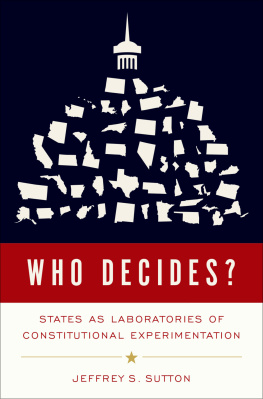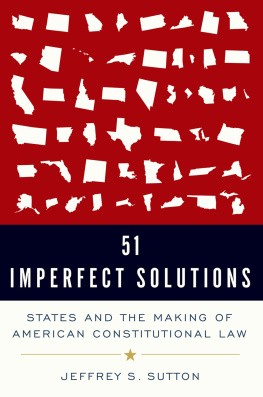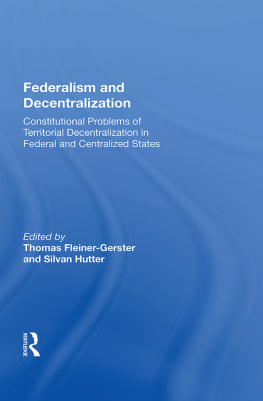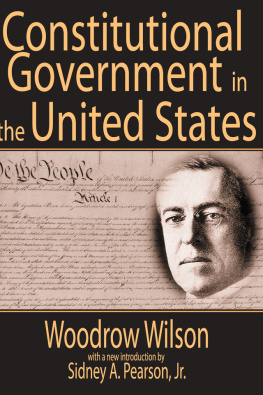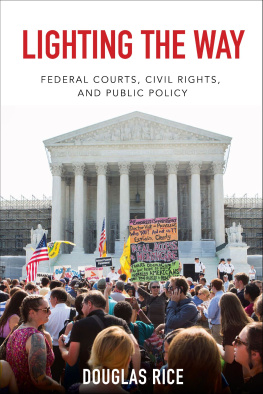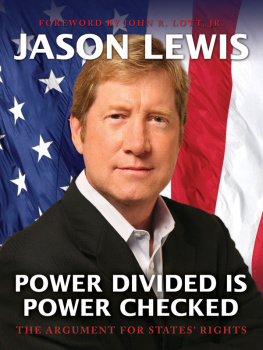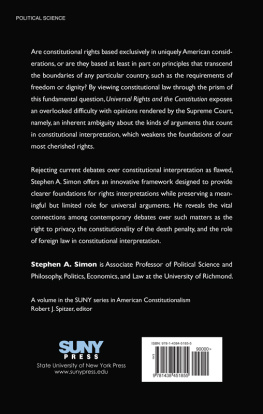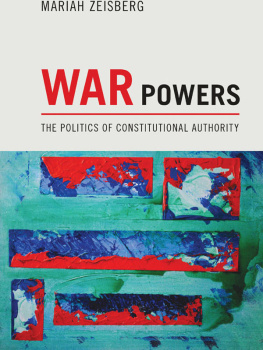WHO DECIDES?


Oxford University Press is a department of the University of Oxford. It furthers the Universitys objective of excellence in research, scholarship, and education by publishing worldwide. Oxford is a registered trade mark of Oxford University Press in the UK and certain other countries.
Published in the United States of America by Oxford University Press
198 Madison Avenue, New York, NY 10016, United States of America.
Oxford University Press 2022
All rights reserved. No part of this publication may be reproduced, stored in a retrieval system, or transmitted, in any form or by any means, without the prior permission in writing of Oxford University Press, or as expressly permitted by law, by license, or under terms agreed with the appropriate reproduction rights organization. Inquiries concerning reproduction outside the scope of the above should be sent to the Rights Department, Oxford University Press, at the address above.
You must not circulate this work in any other form and you must impose this same condition on any acquirer.
Library of Congress Cataloging-in-Publication Data
Names: Sutton, Jeffrey S. (Jeffrey Stuart), 1960 author.
Title: Who decides : states as laboratories of
constitutional experimentation / Jeffrey S. Sutton.
Description: New York, NY : Oxford University Press, [2022] | Includes index. |
Identifiers: LCCN 2021009439 (print) | LCCN 2021009440 (ebook) |
ISBN 9780197582183 (hardback) | ISBN 9780197582206 (epub) | ISBN 9780197581704
Subjects: LCSH: Constitutional lawUnited StatesStates. |
Constitutional amendmentsUnited StatesStates. |
Constitutional historyUnited StatesStates.
Classification: LCC KF4530 .S889 2022 (print) | LCC KF4530 (ebook) |
DDC 342.73/042dc23
LC record available at https://lccn.loc.gov/2021009439
LC ebook record available at https://lccn.loc.gov/2021009440
DOI: 10.1093/oso/9780197582183.001.0001
To my parents, David and Nancy Sutton
Contents


Which prompts this question: What happened when they reached the end of the Trail and it came time, eventually, for the people of the Oregon Territory to apply for statehood and to write their own constitution? Where did they look for guidance? Some states had assistance from knowledgeable scholars, its true. Thanks to funding by railroad interests and unbeknownst to the people of North Dakota at the time, James Bradley Thayer, the celebrated Harvard Law School professor, was a co-author of its constitution, and Thomas Cooley, the renowned Michigan Supreme Court justice, spoke during the debates over it.
In writing about state constitutions, I sometimes have felt like the blacksmith-lawyer and the woodsman-lawyer, knowledgeable about some features of state constitutional law but worried, eventually certain, there was plenty more to know and too little time to sort out every mete and bound. To my luck, several scholars have helped me along the way. Dependable guides all, they have suggested which mountains to climb, which rivers to cross, what parts of the journey to leave to others.
51Imperfect Solutions: States and the Making of American Constitutional Law focused on the liberty and property protections that our state constitutions guarantee. This book shifts from individual rights to structure, to how our state constitutions allocate power within each state, all while comparing the state experiences with the federal experience. Constitutional structure is a daunting topic, making me grateful for the considerable scholarship already undertaken in some of these areas. In contrast to the drafters of many of our state constitutions, I have had access to shelves of books and articles written by dedicated scholars.
In speaking to bar associations, students at law schools, and fellow judges about 51 Imperfect Solutions over the last three years, I have learned a lot, including how much more there is to say about state constitutions. Conversations generated during these speaking events, plus discussions with students in my state constitutional law classes, made me realize how many questions remain unanswered, some about individual rights, others about the role of constitutional structure in promoting liberty, still others about the balance of power between the national and state governments. That explains why this book picks up where the last book left off and why a few parts of the book, mainly in , which borrow in places from State Constitutional Law: The Modern Experience (3rd ed. 2020).
Several young lawyers and law students have helped me with research. Michael Lemanski offered considerable assistance with the research for throughout were John Acton, Giebien Na, Drew Hamilton, Rebecca Hill, Joe Jakubowski, Sam Lioi, John Macy, Giebien Na, Zachary Nallen, John Sutton, and Nathaniel Sutton. Several former law clerks kindly read drafts of the book and gave me useful feedback: Justin Aimonetti, Kyle Grigel, Will Hall, Ben Harris, John Kendrick, Elizabeth Nielson, John Rockenbach, and Sarah Welch.
Commenters included three federal judicial colleagues, Eric Murphy, Bill Pryor, and Chad Readler. Several state court judges kindly looked at draftsRandy Holland, Erin Lagesen, and Fred Nelsonas did scholars Zaki Anwar, Niko Bowie, Erwin Chemerinsky, Sanford Levinson, Jason Mazzone, and Miriam Seifter. So did friends Tom Barnico, Jim Garland, Steve McAllister, and Dan Schweitzer. John McGuiness offered helpful comments on the chapter on state courts and judicial review. Aditya Bamzai, Kristin Hickman, Aaron Saiger, and Chris Walker did the same for the chapter on administrative law, as did Richard Briffault for the chapter on local governments. Sixth Circuit librarians Owen Smith and Jane Underwood offered considerable help in tracking down difficult-to-find books and other resources.
The Oxford team has continued to be highly supportive and helpful. My editor David McBride offered perceptive insights and suggestions and provided reassurance when I needed it. Jeremy Toynbee, Patterson Lamb, and Emily Mackenzie have been terrific in helping with the editing and marketing of the book.
Then theres my indispensable familyPeggy, Nathaniel, John, and Margaretwithout whom this book would not have been started or finished.
for better, for worse, or for more of the same, this is a sequel. After writing 51 Imperfect Solutions, I learned two things. I needed to mention other ideas for protecting individual rights under our fifty-one constitutions, many of them learned from engaging state court judges and lawyers about our state charters. And I needed to tell the other half of the story, the role structure plays in the state and federal constitutions in protecting freedom.
Everything in law and politics, including individual rights, comes back to divisions of power and the evergreen question: Who decides? Do the states, the federal government, or both have authority over the matter? Within each government, how does the relevant constitution delegate power to the legislature, the executive branch, and the judiciary? Our state and federal constitutions give surprisingly different answers to many of these questions and to the control the people retain over public policy decisions and the officials who make them. But who would know? For too long, American law has taken a one-sided view of these questions, focusing on the US Constitutions answers to these questions and rarely considering, sometimes not considering at all, our fifty state constitutions answers to them. A true understanding of American constitutional law requires attention to both. A focus on just one side of the balance not only slights the role of our state constitutions in American government, but it also obscures an encompassing view of each system.

